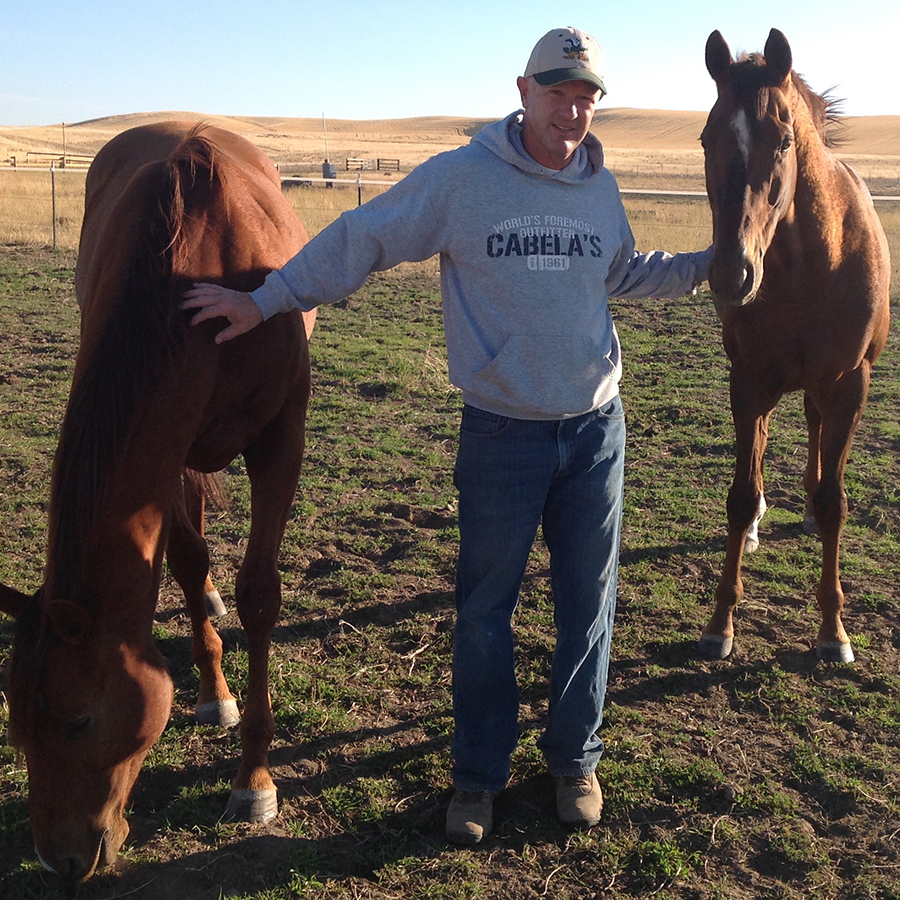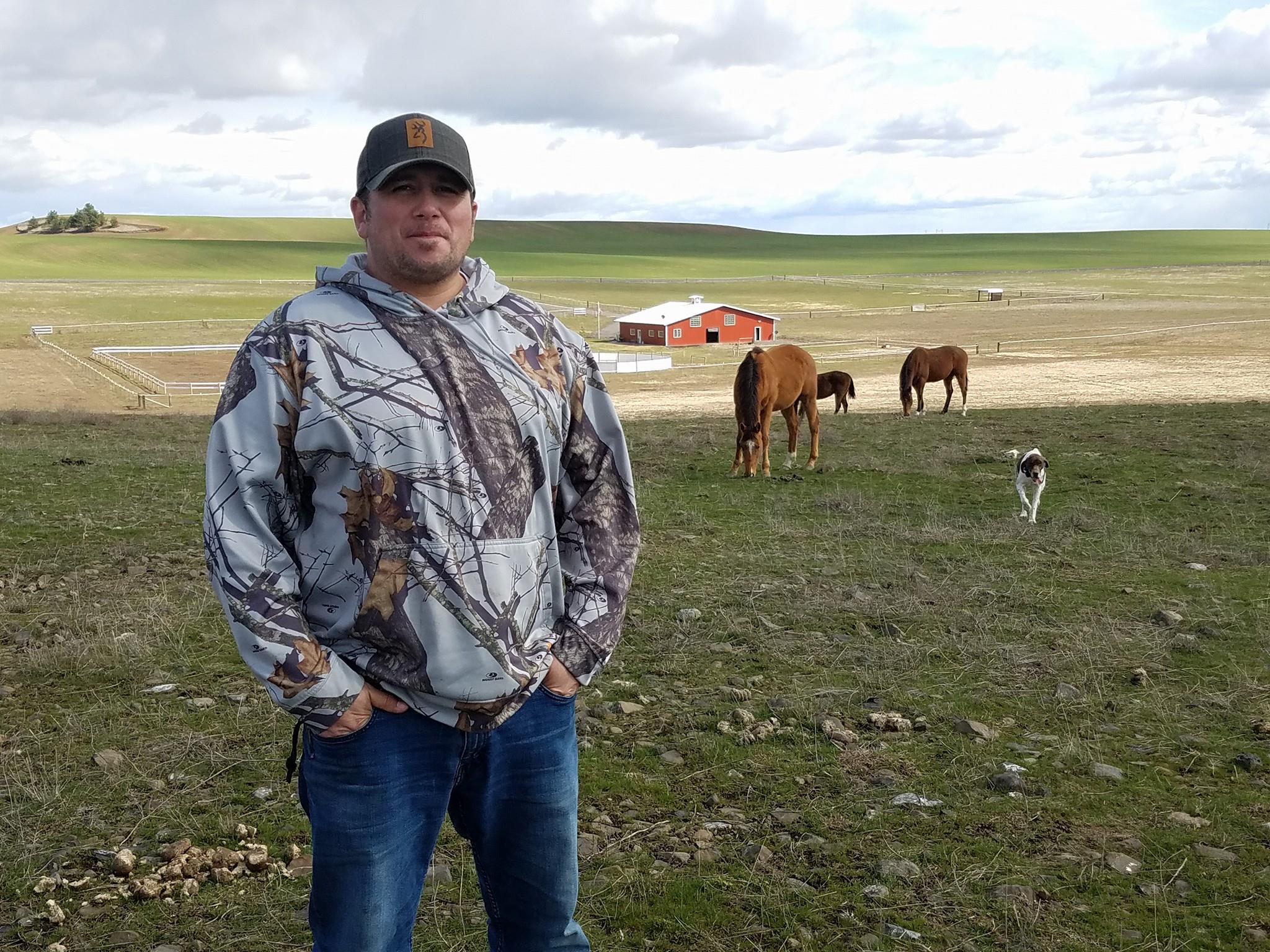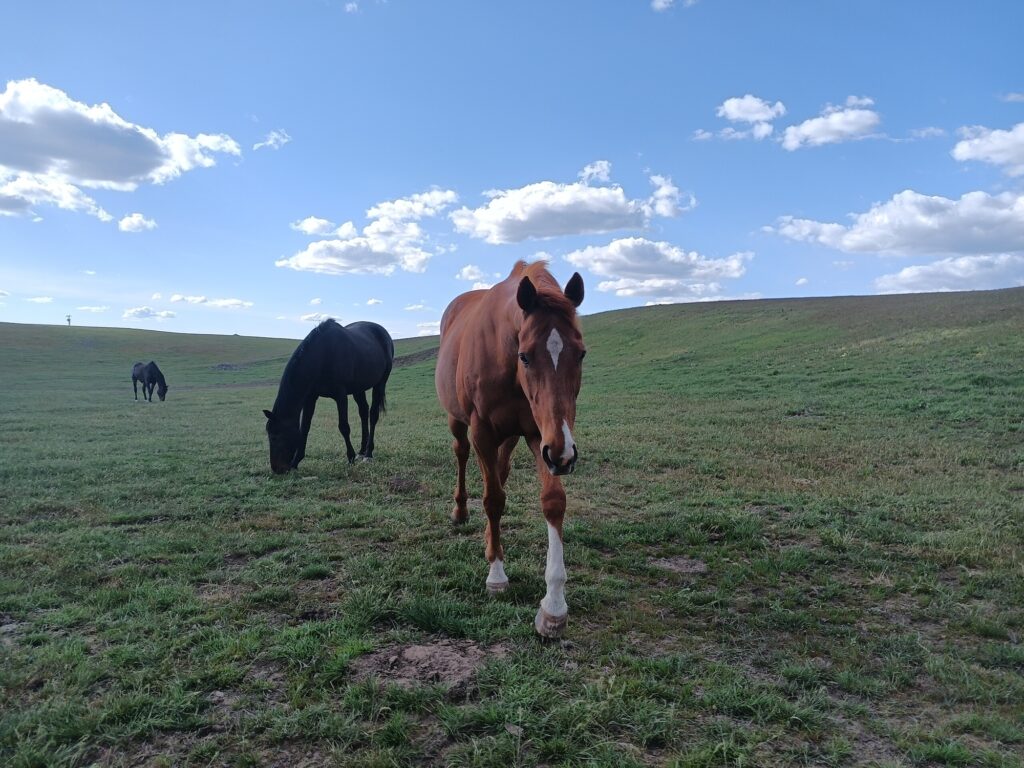Retired Racehorses, Combat Veterans Find Healing at Down the Stretch Ranch
By: Alexandra Kokka
Fifty miles west of Spokane, Wash., away from the hustle and bustle of big city living, everything gets quiet at Down the Stretch Ranch—a solitude that eases the restless minds of both veterans and retired racehorses.
Horse racing and civil service were certainly ingrained in the McCanna family genome. A third generation horseman and younger brother of Washington State Hall of Fame trainer Tim McCanna—Daniel “Boone” McCanna grew up on the backstretch working in his father’s shedrow alongside his Marine Corps veteran cousin, Mark Moran. Boone went on to spend nearly three decades as a jockey agent before deciding it was time for a change of pace.
“It was actually my mom’s idea to start a Thoroughbred retirement facility,” Boone recalled. “My dad always turned his horses out half the year because it was just a seasonal meet in Spokane and then his old horses were always retired at our family farm.”
The respect the McCannas showed their horses on and off the track was the catalyst for Down the Stretch Ranch. Then it was Moran who insisted the organization’s mission include rehabilitation for veterans.
“Mark was a Marine in Vietnam when he was 19,” Boone explained. “One day, while walking through the jungle, someone in their company stepped on a time-triggered explosive. Mark was the third guy from the back of the line and it blew his entire leg off.”
A large percentage of veterans struggle with post-traumatic stress disorder, caused by experiencing or witnessing a terrifying event that can cause nightmares, flashbacks, and severe anxiety. Upon returning from Vietnam, Moran experienced firsthand the cathartic effect working with Thoroughbreds provided his mental health.
In 2014 Boone co-founded Down the Stretch Ranch to serve as a place of solace for retired racehorses and veterans alike. Since its inception, the ranch has been home to 25-34 ex-racehorses every year.
Determined to provide the same opportunity to combat veterans in his community, Moran dedicated himself to forming a veteran therapy program at the farm. The Purple Heart and Bronze Star Marine Corps veteran’s efforts have allowed hundreds of guests to gain access to the life-changing therapy.
“I was never in the military, so it was really nice when we came home to get it started that Mark would be able to talk to the veterans and relate to them better than I could,” Boone said. “He died five years ago, but we’ve kept the veteran program going because it’s a good thing and it honors Mark.”
Over the years, two highly decorated warriors and U.S. Army leaders, Lt. Col. Gregory Allen and Lt. Gen. Michael Ferriter, have been invaluable resources for Boone, directing countless combat veterans to seek refuge at the ranch.
According to Lt. Col. Allen—who served in the Army Rangers, Green Berets, and commanded an infantry battalion in Iraq before culminating his 27-year military career as the chief of staff for the Washington Army National Guard—every soldier is instilled with the “Warrior Ethos.” Consequently, those who display the greatest perseverance of valor and duty to their country experience the most unspeakable hardships while on tour. As a result, many combat warriors fail to heal their traumas through the conventional modes of rehabilitation provided by the Veterans Health Administration.
“Every soldier has his own story,” Allen said. “A lot of the infantry guys, they’re the ones really out on the front lines constantly, going on missions night after night. It gets really stressful and afterwards it’s hard to come back and have a normal life. Some of these guys just need a new direction. When I heard what Boone was doing, I knew we needed to get these guys out there.”
Boone allows the horses and veterans to forge their own relationships through intense, yet unspoken moments of mutual understanding.
“Thoroughbred racehorses are highly trained, specialized, freaking great athletes, just like these guys that are warriors—there’s an instant connection,” Boone said. “I’m no therapist or anything, but letting these guys just kind of do stuff on their own time with the horses brings them out of their shell. To some guys I’ll say, ‘If you want to sleep in, sleep in; if you want to get up, you’ll hear me out here in the morning.’ Almost 10 out of 10 of them are up as soon as they hear me around the barn.
“The ranch is a place that they can call theirs,” Boone said. “Most of the guys that come; they plan to come for a day and they end up staying for a week. Then, they keep coming back because there’s something different every day.”
U.S. Army combat veteran Jerald Reichel served as a machine gunner for two tours in Iraq. In 2016, five years after experiencing an unspeakable amount of death and destruction, he continued to struggle with life as a civilian. Reichel was losing the battle to cope with his mental health and lost sight of a reason to live.
“I’m 100% disabled with PTSD from combat,” Reichel said. “Six years ago I was living in a homeless veterans program. It was a really bad time in my life, I was going through a divorce, feeling depressed, and suicidal. I really didn’t see any hope for the future.”
To this day, Lt. Col. Allen maintains close connections to countless warriors—including Reichel—who were under his command. In his retirement he has dedicated himself to connecting veterans in Washington to the resources that serve them best.
“I was Jerald’s battalion commander in Iraq for about four years,” Lt. Col. Allen said. “He was a good infantry man and wasn’t the only vet I knew that had come back from that last deployment at the end of 2009 and had a hard time adjusting. That’s why I stayed in touch.”

Daniel “Boone” McCanna founded Down the Stretch Ranch to serve as a place of solace for retired Thoroughbreds and veterans alike
Despite the 150-mile distance, when Lt. Col. Allen suggested Boone bring a struggling Reichel out to the ranch, he made the arrangements to pick him up without hesitation. Within minutes of arriving at Down the Stretch Ranch, it was a Thoroughbred named Toruk Makto who altered the course of Reichel’s life. The Kentuckybred son of Rahy had been at the
ranch for almost a year, and in that time Boone had struggled with handling the wily chestnut gelding.
“Boone took me out to the pasture to help feed the horses. Toruk came down the hill and kind of snuck around me then grabbed my shirt with his lips and just laid his head on my shoulder,” Reichel said. “At first I was scared and intimidated, then Boone was like, ‘This freaking horse, man, are you serious? That’s your horse now, dude.’”
The truth was, Boone saw the connection ignite between two kindred spirits—a fiercely independent Thoroughbred and a lost soldier. At first, Reichel didn’t understand what it all meant, but when the panic subsided, something inside of him clicked.
“At that moment, I could feel him and he could feel me; it was spiritual,” Reichel recalled. “From then on somehow I just became in tune with the ranch. It’s my safe place. When I go there I feel joy and happiness. The ranch saved my life. If it wasn’t for that day, I don’t even know if I’d be here right now.”
All these years later, the bond between Reichel and Toruk Makto remains strong. The time spent at the ranch has provided Reichel a sense of belonging and allows him to live in the present moment, a challenge faced by many combat veterans
who spend so much time being haunted by their past.
“Toruk is still the first horse that comes right up to me, but now it’s like I have 27 new friends,” Reichel said. “I don’t see them as big huge horses; they’re all just my buddies. When you’re out there working with the horses, you’re not thinking of the bad times that you’re going through, you’re just thinking of the horses in that time and that moment, right then.”
Like two halves of the whole, Thoroughbreds and veterans just work. Boone may not have served in the military, but his selfless compassion to better the lives of those around him exemplifies a warrior’s spirit. Boone trusts the horses to lead the way in showing veterans like Reichel what the ranch is all about, while the salt-of-the-earth cowboy quietly holds the
space.
“It’s cool to see an animal that’s so large and so powerful, but they’re also really soft and kind at heart,” Reichel said, validating Boone’s approach. “A Thoroughbred just wants to please everybody. They just want to win their race—just like a warrior.”
In December Boone invited Reichel to move into one of the tiny homes on the ranch and help him take care of the horses, in hopes that this will be Reichel’s last job.
“My dad is 89 and it’s been mostly me and him out here for the last eight years,” Boone said. “I told Jerald that as long as he takes care of the tiny home and helps with the horses, he’s the ranch manager now. It’s a new beginning for him and if we work together, this could be his last job because I’m getting old and I’m tired. [laughs] I hope it works, I really like him.”
Down the Stretch Ranch earned accreditation by the Thoroughbred Aftercare Alliance (TAA) in 2018 and continues to uphold their accreditation status today. DTSR is the only TAA-accredited organization in the state of Washington. Rather than deriving funds from the VA, the ranch survives thanks to the generous funding of the TAA, the racing industry, and its supporters in the Washington community and beyond.















